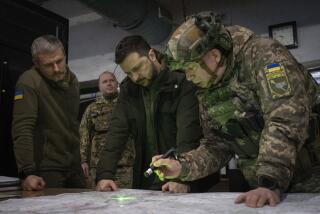Soviet Sees Iraq Caving In; Baghdad Will Ration Gas
- Share via
MOSCOW — Soviet Defense Minister Dmitri T. Yazov predicted Friday that worsening economic conditions in Iraq will soon force Iraqi President Saddam Hussein to abandon his occupation of Kuwait. An announcement that gasoline rationing will begin next week in Iraq lent weight to his forecast.
Speaking at a joint news conference with Defense Secretary Dick Cheney, Yazov warned the United States against a hasty resort to military power to oust Hussein’s troops from Kuwait. He said he believes there still are political options for resolving the impasse.
“There are economic conditions being created that would not permit Iraq to continue its policies for a long time,” Yazov said. “It is not worthwhile to apply military means.”
Throughout the crisis, Soviet officials have stressed the desirability of a non-military solution. Yazov’s comments were the first explicit Soviet statement that the economic embargo against Iraq is likely to soon force Hussein to abandon Kuwait.
Cheney said he, too, hopes that the sanctions will persuade Hussein to quit Kuwait, but he repeated his position that the United States does not rule out the use of force in the tense Persian Gulf.
The Iraqi Oil Ministry’s decision to ration gasoline indicated that the trade embargo is indeed having an impact. The Friday announcement said the purpose of rationing is to save imported chemicals needed to refine crude oil, of which Iraq has an abundance, into products such as gasoline.
Car owners were told that they could obtain rationing coupons at special centers set up for that purpose. Iraqis promptly rushed to fill up their vehicles, and long lines formed outside of gas stations Friday.
The Oil Ministry gave no indication of how much gasoline would be allocated to each owner or on what basis. Rationing of staple foods--milk, meat and bread--began weeks ago.
The news conference in Moscow came at the end of Cheney’s three-day visit to the Soviet Union, in the course of which he discussed the gulf crisis and U.S.-Soviet military issues with top Kremlin leaders.
Earlier Friday, he visited a factory that produces Moscow’s top jet fighter, the MIG-29, and spoke with officials there about the problems of converting from military production to consumer goods.
Yazov said his talks with Cheney were the most “candid and straightforward” discussions the two superpowers have had on mutual reductions in their military efforts.
Cheney outlined the Pentagon’s plans to cut forces by 25% over the next five years while trimming defense spending by $180 billion.
Yazov said the Soviet Union is in the midst of a wrenching debate over how to cut the nation’s massive military without creating unbearable dislocations in the economy.
He said the Soviet Union’s 71-billion-ruble defense budget will be cut by 7% to 8% next year and by greater amounts after that. He said he cannot predict how much will be cut in later years because the Soviet economy is going through revolutionary changes that make such projections impossible.
American officials estimate the Soviets devote at least 20% of their gross national product to defense, a staggering proportion for a country that cannot provide essential consumer goods to its population. And even that figure may be low, some U.S. officials suggested.
“The military goes to the front of every line,” an official traveling with Cheney said.
The Soviet economy is, in fact, two separate economies, he said--one devoted to military production that functions reasonably well and the second, a consumer economy that works not at all.
Cheney and Soviet officials debated the most efficient way to shift some of the economic focus from military to civilian production. At the MIG plant, Cheney suggested that it might be better to dismantle arms factories entirely than to try to convert them to producing consumer items.
But Soviet leaders, long accustomed to making production decisions in the Kremlin, are planning to try to turn weapons plants into appliance makers. The manager of the MIG factory said he is preparing to shift production to civilian airliners and a combination meat grinder and kitchen cabinet.
Some types of defense plants cannot be converted, Soviet officials acknowledged. Yazov cited ballistic missile factories, which would continue to build missiles to replace those that have become obsolete.
Yazov testily denied rumors that the Soviet military is plotting a coup against the civilian leadership because of the radical changes in defense policy and the obvious economic distress.
“Those rumors are aimed at discrediting the armed forces,” Yazov said. “The armed forces are part and parcel of the people of the Soviet Union and will never take up arms against their people.”
Yazov suggested that the Warsaw Pact would be formally abandoned as a military alliance when the members meet in Budapest on Nov. 3.
“There is no need any longer for such an organization,” he said. He left open the possibility that even its political role might be scrapped in the future.
Cheney and Yazov both said continuing contacts between senior leaders of the two former rivals are hopeful signs.
“The enemy image is being diluted,” Yazov said. “The fact that we talked about peace rather than war argues well for the world.”
Cheney arrived Friday night in Paris for talks with French leaders. He will return to Washington on Monday.
More to Read
Sign up for Essential California
The most important California stories and recommendations in your inbox every morning.
You may occasionally receive promotional content from the Los Angeles Times.













